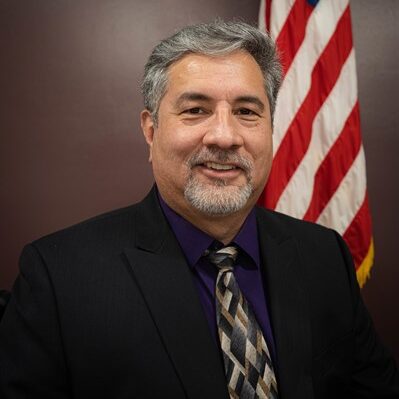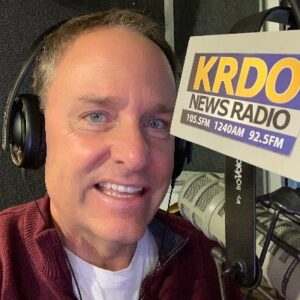
During the Washington Update panel at Hispanic Radio Conference, AM’s importance to rural communities was brought up. Panelist Justin Sasso, President and CEO of the Colorado Broadcasters Association, told a story about a rural AM station in Lamar, Colorado that had been in danger of going off-air forever but was saved by the town’s mayor because of its community importance. That station is KLMR. That mayor is Kirk Crespin. Radio Ink sat down with Kirk and his business partner and radio industry vet Dan Cochell about why they insisted on saving this small AM and why AM still matters.
Radio Ink: When Justin Sasso briefly mentioned KLMR’s story at Hispanic Radio Conference, it piqued the room’s interest. That’s a powerful AM story. How did this come to pass with you both?
Dan: So about a year ago in late July, KLMR was blown off the air from a micro-downburst. The previous owners couldn’t fix it and they were in danger of losing the license. When I saw the building, half the roof was gone and the antenna was dangling in the wind.
I’ve been in the radio business in Colorado for 40 years, with the last 20 in Colorado Springs, but I’ve never owned a radio station. And so when this opportunity came about, I reached out to Kirk. We had talked about possibly buying a company in Lamar previously. He’s not just the mayor, he’s my brother-in-law, but it was great that the mayor wanted to get involved in it too. So we’re off and running.
Radio Ink: For a mayor to step up and say, “This AM station is so important to my community that if nobody else will save it, I will,” is a huge testament to AM radio’s power and value.
Kirk: It’s vital. That’s what I had mentioned to Justin in that meeting about AM. When we look at rural Colorado and the ag market there, there’s a necessity for that. We have farmers in their tractors listening to AM radios because of the coverage, signal strength, and age of the tractors and the equipment. Whether they’re harvesting or plowing, if they’re in the fields, they rely on us. They need to be able to get that real-time information and data.
Not only that but then you also add the historic piece. KLMR radio has been in Lamar since the late 1940s. It is a critical historical piece for our community as well and that’s why we wanted to keep it for future generations. To me, having a radio station that focuses on community events and information is something you can’t get quite as easily on a streaming service. You can customize your music, but you don’t get that local-related information. And that’s what we’re trying to save and support and build on with KLMR.
Radio Ink: What content are you running to serve your local community?

Dan: It’s all local content. I work remotely on KLMR from 5 in the morning till about 10:30 in the morning from Colorado Springs. I host Anything Goes which is a live talk show every day from seven to eight. We take phone calls on the air. It’s all local content and news.
Kirk: Anything Goes is a talk show where we invite our listeners to call in and talk about everything from what’s happening in current events, all the way to happy birthday greetings. But then we also invite other guests to come in and speak about what the current events are.
Last week we had a hospice event, which was a fundraiser, and we invited the director of the local hospice to tell us a little bit about what her event had to do and what was happening with their organization. We had our local light and power superintendent in recently. Those are the topics that our listeners want to hear about what’s happening locally – what’s going on in Lamar Light and Power, the city of Lamar, with the college. So that’s what the Anything Goes programming is about.
On our news, we’re working with some of the local newspapers. We’re doing everything we can to provide that local feed. We already had two community events – our Lamar Days event and Wiley Hay Days – where we broadcasted live for those, yeah. So it’s just that engagement and keeping our community engaged.
Dan: We had a death of a state trooper recently and I went on and did some imaging and let people know that this procession would come down Main Street. That was the only way that you could get information. I don’t believe the other station had that.
Kirk: But we have to work harder than the corporate radio stations of the world. We can’t keep this radio station up without the listeners or without the advertisers or without the report. We’re not the big conglomerate that can just throw money at it.
Radio Ink: You mentioned farmer listening in tractors – I’m not sure that tractors are included in the AM for Every Vehicle Act, but the auto is such a huge forum for all radio listening. How much of a threat do you see to AM’s future?
Dan: Let’s put it this way. There was a tornado in Grenada, Colorado that destroyed an entire farming operation. Thankfully, the family went down into the basement because they heard the warning on AM. The storm killed eight cows, all the buildings, all the equipment, just completely demolished because of this tornado, but they survived.
From a listening standpoint, local radio is so important, especially on the AM dial because that’s where people are used to getting their information, especially out in Lamar. These companies thinking about taking AM stations out of the car… It’s mind-boggling because it’s so short-sighted.
They may not listen in Denver or major markets, but in rural Colorado or at rural stations in general across the country, you’re going to be neglecting an audience that already is neglected in so many different ways. The AM station is the lifeblood of rural communities.
What if something happens to the electrical grid? Or what happens if something happens in a true emergency in the United States? If we have no AM radio stations or quasi-terrestrial radio to warn everybody about what’s happening in the world, what happens to us? If you don’t think something like that could happen, then you’re short-sighted. So that’s why we’re so passionate about these types of things. Just imagine a world without AM radio when a true emergency happens.
If you drove out to southeast Colorado, the moment you get outside of Pueblo, there’s nothing to listen to. Our station is the only thing to listen to for about 150 to 200 miles. There’s nothing out there. We’re a town of around 8,000. Those people deserve information.
Radio Ink: What is your vision for KLMR going forward? What’s the ideal future for KMLR and how does that serve your community?
Kirk: The ideal version of KLMR is what it was when I first went out there. It was the station, the station to get your information. You know, it was so a part of the community. They were at everything and that’s what we want to do. We want to keep the historical piece of KLMR alive. KLMR is Lamar. The call letters reflect that. That’s what that’s the ultimate vision of this radio station is: to preserve a part of this community.
When the station went off the air for three months, a lot of our audience went to satellite radio. We also want to get those people back and cancel their subscriptions and get free radio again.
But we’ve seen this trend, like how in Pueblo they’re closing their print news operations. It’s all about trying to increase profits and lower expenses as a lot of these bigger conglomerates are taking over the media. In doing so, it’s limiting what’s being broadcast for local and regional content and information.
That’s been my goal with KLMR since we decided to save it: to make sure that we remain providing that for our region because it’s important. If we’re relying on those big corporations to do that for us, it’s not going to happen. They’re going to focus on where the advertisers are, and that’s where the big populations are. The only way we can protect ourselves is through something like KLMR radio – local, small market radio and media.
Dan: Just because it’s a small market, doesn’t mean that the sound of the station has to be small market. I know what radio should sound like, but I also know the local aspect as well. It’s a balance to make it sound big, yet local.
We have to keep up the high quality of what people expect to hear when they turn on the radio, but there’s still that aspect of small market. For example, we had a lost dog on Main Street, so I had fun with it. I used my broadcast experience to make it sound good, yet get the information out there. AM and local radio have to strike a balance between making relevant content sound good and knowing how to deliver it. That’s the key.






Good effort. KLMR has a legacy unlike almost any small town radio station. No one is going to get rich in a small town radio operation, but then neither are any of the businesses struggling to stay afloat. Local programming costs more than the jukebox offerings, but the jukeboxes cannot gain the audience loyalty. Lamar will thrive or dwindle based on community cooperation of all local entities.
I did some engineering for KLMR over the years, the community is close. If they can keep the revenue coming in, their future is bright.
Great thoughts, guys. I know southeast Colorado & Lamar/LaJunta. I wish you all the best, truly.
It’s awesome that you’re focused on great, live & local content, because that’s how you’ll create value for advertisers. Especially these days, revenue generation from advertisers is critical so you can continue to provide the services you’re focused on.
From a pure business standpoint: revenue solves everything.
Good luck.